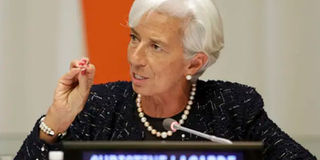IMF board approves removal of age limit for MD post

Outgoing managing director, Ms Christine Lagarde
KAMPALA- The Board of Governors of the International Monetary Fund (IMF) has approved a proposal by its Executive Board to remove the age limit for the position of IMF Managing Director.
The approval required a simple majority of the votes cast, with a minimum participation requirement of a majority of governors holding two-thirds of the total voting power. Voting ran from August 21 to September 4.
“Since 1951, the IMF’s By-Laws had prohibited the appointment of a candidate aged 65 or over as Managing Director, and had also prohibited the Managing Director from serving past his/her 70th birthday.
The amendment to the By-Laws adopted by the Board of Governors, which is effective immediately, brings the Managing Director’s terms of appointment into line with those of members of the IMF Executive Board, which the Managing Director chairs, and those of the President of the World Bank Group, who are not subject to an age limit.
Currently, the IMF Executive Board is engaged in the selection of a successor to outgoing Managing Director Christine Lagarde, who will step down on September 12. Nominations to the position close on September 6, 2019, and we intend to complete the selection process by October 4.
The Board approved the decision as outlined below:
The successful candidate for the position of Managing Director will have a distinguished record in economic policymaking at senior levels.
He or she will have an outstanding professional background, will have demonstrated the managerial and diplomatic skills needed to lead a global institution, and will be a national of any of the Fund’s members.
As chief of the Fund’s staff and as Chair of the Executive Board, (s)he will be capable of providing strategic vision for the work of a high quality, diverse, and dedicated staff; and will be firmly committed to advancing the goals of the Fund by building consensus on key policy and institutional issues, including through close collaboration with the Executive Board, under whose direction (s)he will fulfil his or her responsibilities.
(S)he will have a proven understanding of the Fund and the policy challenges facing the Fund’s diverse global membership. (S)he will have a firm commitment to, and an appreciation of, multilateral cooperation and will have a demonstrated capacity to be objective and impartial. (S)he will also be an effective communicator among other major requirements.
The period for submitting nominations for the position of the next Managing Director closed on Friday, September 6. One nominee, Ms Kristalina Georgieva, currently Chief Executive Officer of the World Bank, and a Bulgarian national, has confirmed willingness to be considered as a candidate.
In the statement issued in Washington DC, officials say the Board will now proceed in line with the process described in decision of July 26, including holding meetings between the candidate and Executive Directors. The Board’s goal is to complete the selection process as soon as possible, and at the latest by October 4, 2019.
The board of governors is the highest decision-making body of the IMF and consists of one governor and one alternate governor appointed by each member country. The governor is usually the minister of finance or the governor of the central bank. Most powers of the IMF are vested in the board of governors. The Board of Governors may delegate to the Executive Board all except certain reserved powers. The Board of Governors normally meets once a year.
The Executive Board functions in continuous session and is responsible for conducting the business of the IMF. It is composed of 24 Directors, who are elected by member countries or by groups of countries. The Managing Director serves as its chairman.
The board usually meets several times each week. It carries out its work largely on the basis of papers prepared by IMF management and staff.




